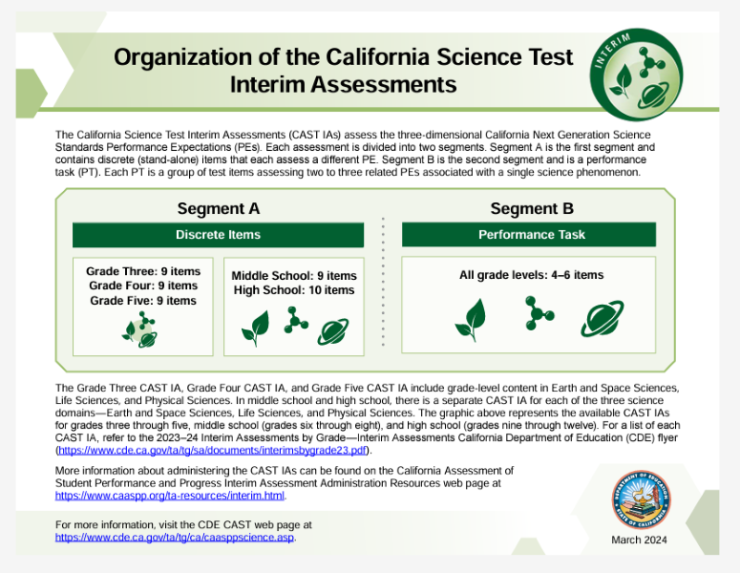California Science Test Interim Assessments: A Flexible Tool for Monitoring Student Progress in Science
By Krista Pohl, Education Programs Assistant, and Vigdis Asmundson, Education Research Evaluation Administrator, California Department of Education (CDE)
Released in October 2023, the California Science Test (CAST) Interim Assessments are an optional tool for educators to measure student progress in science. Aligned with California’s Next Generation Science Standards (NGSS), interim assessments help teachers gain valuable insights into what students know and can do using key scientific concepts and skills.
The interim assessments can be administered to students in either a standardized (e.g., benchmark) or nonstandardized (e.g., formative) manner, or used by school and district staff for professional development.
Currently, there are 18 CAST Interim Assessments available. For elementary grades (3-5), two assessments are offered per grade level, following an integrated model that includes all three domains in each assessment. Middle and high school students have two assessments available per domain in each grade band. Each assessment consists of 13-16 items, covering a range of performance expectations designed to assess what students know and can do in science. Every assessment includes one constructed response item that must be hand-scored in the Teacher Hand Scoring System. Explore the Organization of the CAST Interim Assessments flyer for more information about the structure.

One of the key features of the CAST Interim Assessments is their flexibility in administration. They can be used in both standardized (e.g., benchmark) and nonstandardized (e.g., formative) ways. Standardized administrations are traditional testing situations, offering students a comparable experience and providing teachers with useful data about students’ progress. In nonstandardized administrations, teachers can administer the assessments more informally—either in whole-class instruction or in smaller group settings—allowing for greater adaptability to students' needs, lesson and unit planning, and classroom dynamics.
When the CAST Interim Assessments are administered in a standardized format, and students are rostered to teachers, data is available in the California Educator Reporting System (CERS). CAST Interim Assessment results in CERS include both item level data, which provides information about student performance on individual questions, and a summative report displaying student achievement by domain.
The California Department of Education (CDE) hosted a CAST Interim Assessments Shared Practices Webinar in October 2024, featuring educators from various grade levels sharing their experiences and the benefits they found around using the interim assessments. The webinar explored how the CAST Interim Assessments can be administered in both standardized and nonstandardized contexts, offering a range of practical strategies for integration. The webinar recording is available now on the CAASPP-ELPAC Website. Hear directly from educators with experience administering the CAST Interim Assessments!
The California Department of Education (CDE) provides many additional interim assessment resources. The Interim Assessment Viewing System allows teachers to preview the items or display items to students for whole-class instruction. The Interim Assessment Lookup Tool provides a list of all the interim assessments, which performance expectations are measured, and how many items are on each assessment. For more resources on using the CAST Interim Assessments, visit the Interim Assessments webpage on the CAASPP-ELPAC Website.
About the Authors

Krista Pohl is an Education Programs Assistant with the California Department of Education (CDE) in the Assessment Development and Administration Division. She is currently working in the Science Office on the California Science Test (CAST) organization, development, and outreach. Leading to her role with the CDE is eight years of elementary school teaching experience, including two years as a Professional Development Coordinator. Krista has a Master’s Degree in Instruction and Curriculum and Multiple Subject Teaching Credential.

Vigdis Asmundson is the lead administrator of the Science Office in the Assessment Development and Administration Division of the CDE. She is currently completing a Ph.D. in School Organization and Educational Policy at the University of California, Davis. She also served as a School Board Trustee for the Davis Joint Unified School District. Vigdis was a teacher for 19 years, primarily teaching middle school science, as well as a variety of subjects in elementary, high school, and higher education in California, as well as a variety of populations across the United States and internationally.





